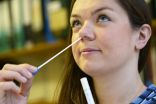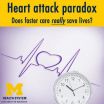Clean energy 'bio batteries' a step closer
2014-11-19
(Press-News.org) Researchers from the University of East Anglia (UEA) are a step closer to enhancing the generation of clean energy from bacteria.
A report published today shows how electrons hop across otherwise electrically insulating areas of bacterial proteins, and that the rate of electrical transfer is dependent on the orientation and proximity of electrically conductive 'stepping stones'.
It is hoped that this natural process can be used to improve 'bio batteries' which could produce energy for portable technology such as mobile phones, tablets and laptops - powered by human or animal waste.
Many micro-organisms can, unlike humans, survive without oxygen. Some bacteria survive by 'breathing rocks' - especially minerals of iron. They derive their energy from the combustion of fuel molecules that have been taken into the cell's interior.
A side product of this reaction is a flow of electricity that can be directed across the bacterial outer membrane and delivered to rocks in the natural environment - or to graphite electrodes in fuel cells.
This means that the bacteria can release electrical charge from inside the cell into the mineral, much like the neutral wire in a household plug.
The research team looked at proteins called 'multi-haem cytochromes' contained in 'rock breathing' bacteria such as species of Shewanella.
Lead researcher Prof Julea Butt, from UEA's School of Chemistry and School of Biological Sciences said: "These bacteria can generate electricity in the right environment.
"We wanted to know more about how the bacterial cells transfer electrical charge - and particularly how they move electrons from the inside to the outside of a cell over distances of up to tens of nanometres.
"Proteins conduct electricity by positioning metal centres - known as haems - to act in a similar way to stepping stones by allowing electrons to hop through an otherwise electrically insulating structure. This research shows that these centres should be considered as discs that the electrons hop across.
"The relative orientation of neighbouring centres, in addition to their proximity, affects the rates that electrons move through the proteins.
"This is an exciting advance in our understanding of how some bacterial species move electrons from the inside to the outside of a cell and helps us understand their behaviour as robust electron transfer modules.
"We hope that understanding how this natural process works will inspire the design of bespoke proteins which will underpin microbial fuel cells for sustainable energy production."
INFORMATION:
The research was funded by the Biotechnology and Biological Sciences Research Council (BBSRC) and performed in collaboration with researchers at University College London, UK and the Pacific Northwest National Laboratory, USA.
'Multi-haem cytochromes in Shewanella oneidensis MR-1: structures, functions and opportunities' is published in the Journal of the Royal Society Interface on November 19, 2014.
[Attachments] See images for this press release:

ELSE PRESS RELEASES FROM THIS DATE:
2014-11-19
People taking part in this year's Flusurvey, the UK's biggest crowd-sourced study of influenza will for the first time be offered a swab to confirm if their symptoms are caused by a flu virus or not as part of a new collaboration with i-sense. Data from social media and internet searches will also be combined with Flusurvey, allowing flu trends to be monitored across the UK more accurately and earlier than ever before.
Flusurvey scientists at the London School of Hygiene & Tropical Medicine will analyse weekly information relating to symptoms, provided in an online questionnaire ...
2014-11-19
David King, clinical lecturer in paediatrics at the University of Sheffield, says medical professionals and consumers need to be aware that such devices "have no proved use in safeguarding infants or detecting health problems, and they certainly have no role in preventing [sudden infant death syndrome] SIDS."
Wearable devices for infants are a growing industry worldwide. Devices that attach to a newborn baby to monitor its vital signs are marketed by several US companies at a cost of around $200 to $300 to give parents "peace of mind" about their baby's health.
One ...
2014-11-19
The authors say their findings are applicable to law enforcement work outside the US and support the view that stressful work related activities can "trigger" sudden cardiac death.
Law enforcement is a dangerous occupation. In 2011-2012, the fatality rate among US patrol officers was 15-16 per 100,000 full time workers - about 3-5 times the national average for private sector employees.
Some evidence suggests that cardiovascular disease is higher among police officers than the general population, but data about the impact of specific on duty activities ...
2014-11-19
Observational studies have suggested that lower levels of vitamin D are associated with increased mortality, but whether low vitamin D concentrations are a cause of increased mortality or simply a consequence of poor health is thus unclear.
This is an important question, say the authors, as millions of people worldwide are regularly taking vitamin D supplements, presumably with the aim of preventing diseases and hopefully living longer.
Genetic variants have been reliably associated with circulating concentrations of vitamin D, a marker of vitamin D status. So a research ...
2014-11-19
Boston, MA -- Police officers in the United States face roughly 30 to 70 times higher risk of sudden cardiac death (SCD) when they're involved in stressful situations--suspect restraints, altercations, or chases--than when they're involved in routine or non-emergency activities, according to a new study from Harvard School of Public Health (HSPH) and Cambridge Health Alliance (CHA). It is the first study to provide data that demonstrates the impact of stressful duties on on-duty SCD.
The researchers also found that physical training activities--which police don't consider ...
2014-11-19
ANN ARBOR, Mich. -- A national effort to shave minutes off emergency heart attack treatment time has increased the chance that each patient will survive, a new study suggests. But yet the survival rate for all patients put together hasn't budged.
It seems like a paradox. But wait, say the authors of the new report: the paradox vanishes with more detailed analysis of exactly who has been getting this treatment.
Far more people are getting emergency angioplasty and stents for heart attacks now than before. That number now includes more people with more complicated health ...
2014-11-19
Barcelona, Spain: A phase I trial of the first drug designed to inhibit the cancer-causing activity of a mutated enzyme known as isocitrate dehydrogenase (IDH) 1, which is involved in cell metabolism, has shown clinical activity in patients with advanced acute myeloid leukaemia (AML) with the IDH1 mutation.
Professor Daniel Pollyea, M.D. will tell the 26th EORTC-NCI-AACR [1] Symposium on Molecular Targets and Cancer Therapeutics in Barcelona, Spain, today (Wednesday) that early results from the phase 1 clinical trial of the drug AG-120, an oral, selective and potent inhibitor ...
2014-11-19
Barcelona, Spain: Researchers have found that patients with an advanced form of kidney cancer, for which there is no standard treatment and a very poor prognosis, respond well to a combination of two existing anti-cancer drugs.
Dr Ramaprasad Srinivasan, head of the Molecular Cancer Therapeutics Section, Urologic Oncology Branch, of the National Cancer Institute in Maryland, USA, will tell the 26th EORTC-NCI-AACR [1] Symposium on Molecular Targets and Cancer Therapeutics in Barcelona, Spain, today (Wednesday) that the combination of bevacizumab and erlotinib produced ...
2014-11-19
Barcelona, Spain: Results from a trial of the anti-cancer drug galeterone show that it is successful in lowering prostate-specific antigen (PSA) levels in men with a form of prostate cancer that is resistant to treatment with hormone therapy (castration-resistant prostate cancer or CRPC).
Associate professor Mary-Ellen Taplin, of the Dana-Farber Cancer Institute, Boston, USA, will tell the 26th EORTC-NCI-AACR [1] Symposium on Molecular Targets and Cancer Therapeutics in Barcelona, Spain, today (Wednesday) that galeterone was well tolerated by patients in the ARMOR2 trial, ...
2014-11-19
VIDEO:
New research from the University of Copenhagen and Copenhagen University Hospital shows that low blood vitamin D levels increase mortality. The study included 96,000 Danes and was recently published in...
Click here for more information.
Vitamin D deficiency is generally associated with an increased risk of poor bone health. However, recent studies have shown that low levels of this important vitamin also involve an increased risk of other diseases and higher mortality ...
LAST 30 PRESS RELEASES:
[Press-News.org] Clean energy 'bio batteries' a step closer



